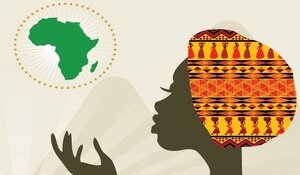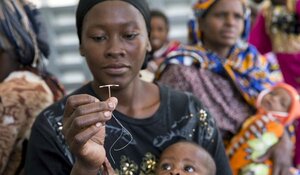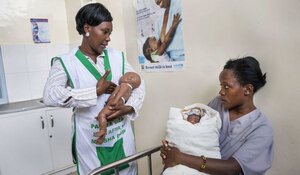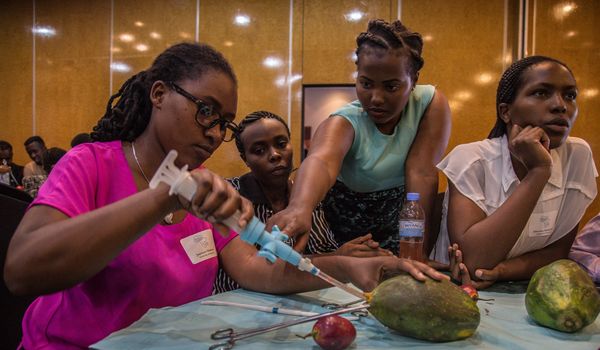The Legal Architecture of SRHR in Africa
(23 June 2025) Sexual and Reproductive Health and Rights (SRHR) in Africa are governed by a raft of frameworks aimed at keeping states accountable and protecting the rights of vulnerable groups whose rights are at risk of violations. These frameworks also form a basis for intervention through strategic impact litigation at regional and domestic courts of law. While many legal cases focus on redressing individual harms, strategic litigation on SRHR has had broader effects by setting legal precedents, influencing policy reform, and shifting public discourse on reproductive justice.
Regionally, the African Union (AU) has established several key frameworks to advance SRHR. One of the most significant frameworks is the Protocol to the African Charter on Human and Peoples' Rights on the Rights of Women in Africa (commonly known as the Maputo Protocol).

Article 14 of the protocol explicitly guarantees women’s reproductive rights, including access to contraception and safe abortion under specific circumstances, such as when pregnancy endangers a woman’s life or results from rape or incest. It also urges state parties to ensure accessible reproductive healthcare services. Complementing this protocol is the Maputo Plan of Action (2006, revised 2016 - 2030) which serves as a strategic roadmap for achieving universal access to comprehensive sexual and reproductive health services. The plan emphasizes integrating SRHR into primary healthcare, strengthening health systems, and increasing domestic funding for reproductive health programs. The AU Agenda 2063: The Africa We Want further reinforces these commitments, emphasizing the need to ensure universal access to reproductive healthcare.
Changing the Law, Changing Lives: SRHR Litigation in Kenya
SRHR litigation in Africa has increasingly become a powerful tool for enforcing constitutional rights, challenging harmful laws, and holding governments accountable for violations. Courts across the continent have played a critical role in defining state obligations regarding reproductive healthcare, maternal health, abortion rights, and protection from gender-based violence.
The legal framework for SRHR litigation in Kenya is grounded in the Constitution of Kenya (2010), which guarantees the right to health, equality, and dignity. Article 43 of the Constitution explicitly provides for the right to healthcare, including reproductive healthcare, while Article 27 ensures equality and non-discrimination. International and regional instruments, such as the Protocol to the African Charter on Human and Peoples’ Rights on the Rights of Women in Africa further support reproductive rights.

One of the most significant cases in Kenyan SRHR litigation is JMM & Another v. Attorney General & 4 Others (Petition No. 266 of 2015), which focused on access to safe abortion services. In this case, JMM, a minor who became pregnant from sexual abuse (which is an offence under the Sexual Offenses Act section 8), sought a legal abortion but suffered severe complications due to unclear medical guidelines. The Ministry of Health had withdrawn the Standards and Guidelines for Reducing Morbidity and Mortality from Unsafe Abortion, leading to a lack of clarity for medical practitioners and leaving women like JMM vulnerable. The High Court ruled that this withdrawal violated the right to health and dignity, affirming that access to safe abortion is a constitutional right in cases permitted by law. It should be noted that prevailing social norms and cultural perspectives still render elective abortion unacceptable in nonemergency circumstances.
Similarly, a case involving the Federation of Women Lawyers in Kenya i.e., the FIDA-Kenya case (Petition No. 562 of 2012) challenged the government's failure to provide quality maternal healthcare. The petition was filed on behalf of two women, M and E, who died due to medical negligence in public maternity facilities. The court found that the state’s failure to ensure quality maternal health services violated their rights and reinforced the government’s obligation to provide accessible and dignified maternal healthcare. This ruling set an important precedent that preventable maternal deaths resulting from systemic failures are human rights violations.
Another groundbreaking case in Kenya’s SRHR litigation is Petition 605 of 2014 SWK & Others vs. MSF France & Others, which addressed the forced sterilization of women living with HIV. The petitioners argued that they were sterilized without informed consent while seeking maternal healthcare, a violation of their reproductive rights and bodily autonomy. The court held that forced sterilization amounted to a breach of their rights to health, dignity, and informed consent, highlighting the need for stronger protection against reproductive violence, especially for marginalized groups such as women living with HIV.

From Obstacles to Opportunity: The Transformative Power of SRHR Litigation
Despite these successful attempts to litigate SRHR, several challenges hinder the full realization of these rights. Deeply ingrained cultural beliefs contribute to stigma around contraception and reproductive rights. Domestic financing for reproductive healthcare remains inadequate, limiting access to essential services. Due to the prevailing stigma around SRHR rights discourses, vulnerable groups such as adolescents, people with disabilities, and LGBTIQ+ individuals often face discrimination in accessing SRHR services. Social stigma and restrictive laws make it difficult for these groups to seek reproductive healthcare without fear of judgment or legal consequences.
Moreover, recent shifts in international funding, such as the withdrawal of support by USAID from certain reproductive health programs in Africa, threaten to exacerbate these challenges. USAID has historically been a significant donor for SRHR initiatives, including family planning, HIV prevention, and maternal health. Its reduced involvement will lead to funding gaps, undermining service delivery and weakening health systems already strained by limited domestic budgets. This withdrawal risks reversing progress made in expanding access to contraception and safe reproductive health services, especially for marginalized communities most vulnerable to discrimination and neglect. The void left by such donor pullouts underscores the urgent need for increased domestic investment and innovative financing to sustain and advance SRHR gains across the continent.
SRHR litigation remains an essential tool in holding governments accountable for reproductive health violations. Courts have become an essential avenue for promoting SRHR when legislative and policy efforts fail or are insufficient. Through strategic litigation, civil society organizations, human rights lawyers, and affected individuals have been able to contest discriminatory policies, demand the enforcement of constitutional rights, and push for legal reforms. Successful cases such as the FIDA Kenya Case (on maternal health) have compelled the state to review maternal health policies and have catalyzed advocacy efforts. As jurisprudence continues to evolve, litigation remains a key mechanism for ensuring that national laws align with regional and international human rights standards.

